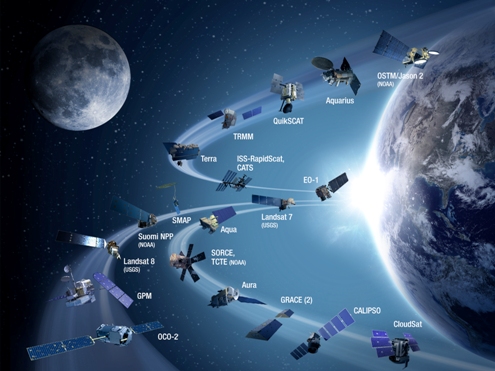New Definitions of National Security: Difference between revisions
Siterunner (talk | contribs) No edit summary |
Siterunner (talk | contribs) No edit summary |
||
| Line 65: | Line 65: | ||
[https://www.whitehouse.gov/blog/2015/05/01/statement-ostp-director-john-p-holdren-house-proposed-funding-cuts-nasas-critical-ea '''Re: funding cuts to NASA's critical Earth science and space technology programs'''] | [https://www.whitehouse.gov/blog/2015/05/01/statement-ostp-director-john-p-holdren-house-proposed-funding-cuts-nasas-critical-ea '''Re: funding cuts to NASA's critical Earth science and space technology programs'''] | ||
On May 1, 2015, White House Office of Science and Technology Policy Director Dr. John P. Holdren issued the following statement on proposed funding cuts to NASA's critical Earth science and space technology programs: | |||
'''"If enacted, the NASA authorization bill headed to the House floor later this month would do serious damage to the Nation’s space program, as well as to Earth-observation and Earth-science programs essential for predicting, preparing for, and minimizing the damage from disasters both natural and human-induced.''' | '''"If enacted, the NASA authorization bill headed to the House floor later this month would do serious damage to the Nation’s space program, as well as to Earth-observation and Earth-science programs essential for predicting, preparing for, and minimizing the damage from disasters both natural and human-induced.''' | ||
The bill’s cuts to space-technology development would not only risk continued U.S leadership in the space industry, but would also impede progress on precisely those technologies—on-orbit refueling, advanced space propulsion, radiation protection in deep space, and more—needed to make crewed missions to deep space a reality. In the absence of robust investments to bring these technologies into being, the goal of sending U.S. astronauts to Mars in the 2030s could be in jeopardy. | |||
The House bill would also gut the NASA “mission to planet Earth”—the satellite observations and related research that provide key measurements and insights relevant to forecasting and tracking hurricanes, fighting wildfires, observing the state of the world’s farms and forests, mapping the extent of droughts, measuring the stocks of groundwater, and monitoring the likelihood of landslides. The draconian cuts in the House bill would also delay advances in our ability to research and prepare for volcanic eruptions, earthquakes, and tsunamis and blind us to changes in the Earth’s oceans and ice sheets that can be discerned only from space. | |||
NASA’s mission to observe, understand, and explore the solar system and the cosmos beyond has long been matched in importance by its mission to use the unrivaled vantage point of Earth orbit for looking downward, to better understand the only home that humanity currently has. It is difficult to understand why, at this time of U.S. leadership in both the outward-facing and inward-facing facets of NASA’s operations in space, the Congress would want to undermine that leadership and sacrifice the panoply of benefits it brings to the Nation." | |||
○ ○ ○ ○ ○ ○ ○ ○ ○ ○ ○ ○ ○ ○ ○ ○ ○ ○ ○ ○ ○ ○ ○ ○ ○ ○ ○ ○ ○ ○ ○ ○ ○ ○ ○ ○ ○ ○ ○ ○ ○ ○ ○ ○ ○ | ○ ○ ○ ○ ○ ○ ○ ○ ○ ○ ○ ○ ○ ○ ○ ○ ○ ○ ○ ○ ○ ○ ○ ○ ○ ○ ○ ○ ○ ○ ○ ○ ○ ○ ○ ○ ○ ○ ○ ○ ○ ○ ○ ○ ○ | ||
| Line 85: | Line 85: | ||
http://strategicdemands.com/environmental-security-2/ | http://strategicdemands.com/environmental-security-2/ | ||
http://strategicdemands.com/ | http://strategicdemands.com/new-definitions-of-security/ | ||
http://strategicdemands.com/security-design/ | http://strategicdemands.com/security-design/ | ||
| Line 102: | Line 102: | ||
; <big><big>Nuclear Proliferation ≠ Environmental Security </big></big> | ; <big><big>Nuclear Proliferation ≠ Environmental Security </big></big> | ||
http://strategicdemands.com/one-day-in-the-life-of-a-nuclear-arms-race/ | |||
http://strategicdemands.com/hair-trigger-ready-fire/ | http://strategicdemands.com/hair-trigger-ready-fire/ | ||
Revision as of 11:49, 7 July 2015
- New Definitions of National & Global Security
Ⅰ Ⅱ Ⅲ Ⅳ Ⅴ Ⅵ Ⅶ Ⅷ Ⅸ Ⅹ Ⅺ Ⅻ ----- Ⅻ Ⅺ Ⅹ Ⅸ Ⅷ Ⅶ Ⅵ Ⅴ Ⅳ Ⅲ Ⅱ Ⅰ
- Environmental Security ↔ National Security
National Security: Enhanced & Extended via Environmental Security Policy & Practices
http://www.greenpolicy360.net/w/Earth_and_Space,_Politics
http://www.greenpolicy360.net/w/Category:Environmental_Security
○ ○ ○ ○ ○ ○ ○ ○ ○ ○ ○ ○ ○ ○ ○ ○ ○ ○ ○ ○ ○ ○ ○ ○ ○ ○ ○ ○
- Environmental Security
http://strategicdemands.com/nasa-pushes-earth-science-to-strengthen-security-capabilities/
http://strategicdemands.com/priorities-skew-away-from-nasa-and-security/
○ ○ ○ ○ ○ ○ ○ ○ ○ ○ ○ ○ ○
Updates: Q2 2015
- Undercutting Security, Congress Moves to Eviscerate Earth Science Programs
- "Security, Earth Science from Space"
House Science Committee Guts Earth Sciences Budget / May 1, 2015
"Republicans in the House and Senate don't want NASA studying Earth..." http://www.washingtonpost.com/blogs/capital-weather-gang/wp/2015/04/30/proposed-massive-cuts-to-nasa-earth-science-budget-draw-protest/ … re: "massive cuts" to #EarthScience
GOP Attacks Earth Science At NASA, Climate Change Research In Peril
Phil Plait: There’s no other way to put this, so I’ll be succinct: A passel of anti-science global warming denying GOP representatives have put together a funding authorization bill for NASA that at best cuts more than $300 million from the agency’s current Earth science budget. At worst? More than $500 million.
In an op-ed in The Hill, Rep. Eddie Bernice Johnson, D-Texas, wrote that the GOP members of the committee didn't even give the writeup of the bill to Democrats on the committee until very late last week, indicating the GOP members are not operating in good faith on this issue.
○
Rep. Eddie Johnson: Despite the fact that in January NASA announced 2014 was likely the warmest year since 1880, it should come as no surprise that the majority wants to cut funding for climate science. Embarrassingly, just last week, every single Republican member of this committee present voted against the notion that climate change might be caused by people.
○
Rep Donna Edwards (D-Md.): [T]he bill puts at risk 10,000 jobs at Goddard and would have “huge, deep, lasting” impacts... “I will not stand by quietly and enable that to happen.”
Rep Donna F Edwards @repdonnaedwards Apr 30 (2/2) My amendment to restore half a billion dollars in @NASA #EarthScience cuts defeated along party lines.
Rep Donna F Edwards @repdonnaedwards Apr 30 Disappointed that @HouseScience Committee leadership passed a partisan bill today which guts @NASA #EarthScience programs. (1/2)
○
Re: funding cuts to NASA's critical Earth science and space technology programs
On May 1, 2015, White House Office of Science and Technology Policy Director Dr. John P. Holdren issued the following statement on proposed funding cuts to NASA's critical Earth science and space technology programs:
"If enacted, the NASA authorization bill headed to the House floor later this month would do serious damage to the Nation’s space program, as well as to Earth-observation and Earth-science programs essential for predicting, preparing for, and minimizing the damage from disasters both natural and human-induced.
The bill’s cuts to space-technology development would not only risk continued U.S leadership in the space industry, but would also impede progress on precisely those technologies—on-orbit refueling, advanced space propulsion, radiation protection in deep space, and more—needed to make crewed missions to deep space a reality. In the absence of robust investments to bring these technologies into being, the goal of sending U.S. astronauts to Mars in the 2030s could be in jeopardy.
The House bill would also gut the NASA “mission to planet Earth”—the satellite observations and related research that provide key measurements and insights relevant to forecasting and tracking hurricanes, fighting wildfires, observing the state of the world’s farms and forests, mapping the extent of droughts, measuring the stocks of groundwater, and monitoring the likelihood of landslides. The draconian cuts in the House bill would also delay advances in our ability to research and prepare for volcanic eruptions, earthquakes, and tsunamis and blind us to changes in the Earth’s oceans and ice sheets that can be discerned only from space.
NASA’s mission to observe, understand, and explore the solar system and the cosmos beyond has long been matched in importance by its mission to use the unrivaled vantage point of Earth orbit for looking downward, to better understand the only home that humanity currently has. It is difficult to understand why, at this time of U.S. leadership in both the outward-facing and inward-facing facets of NASA’s operations in space, the Congress would want to undermine that leadership and sacrifice the panoply of benefits it brings to the Nation."
○ ○ ○ ○ ○ ○ ○ ○ ○ ○ ○ ○ ○ ○ ○ ○ ○ ○ ○ ○ ○ ○ ○ ○ ○ ○ ○ ○ ○ ○ ○ ○ ○ ○ ○ ○ ○ ○ ○ ○ ○ ○ ○ ○ ○
- The Security Horizon
National Security: Placed at Risk by Undercutting Environmental Security Policy & Practices
http://strategicdemands.com/environmental-security/
http://strategicdemands.com/environmental-security-2/
http://strategicdemands.com/new-definitions-of-security/
http://strategicdemands.com/security-design/
http://strategicdemands.com/ground-truth/
http://strategicdemands.com/stratdem-factoid-re-road-security/
http://strategicdemands.com/new-definitions-national-security/
http://strategicdemands.com/speaking-environmental-security/
○ ○ ○ ○ ○ ○ ○ ○ ○ ○ ○ ○ ○ ○ ○ ○ ○ ○ ○ ○ ○ ○ ○ ○ ○ ○ ○ ○ ○ ○ ○
- Nuclear Weapons — US Trillion Dollar Modernization/Expansion
- Nuclear Proliferation ≠ Environmental Security
http://strategicdemands.com/one-day-in-the-life-of-a-nuclear-arms-race/
http://strategicdemands.com/hair-trigger-ready-fire/
http://strategicdemands.com/re-pits-nuclear-warhead-cores/
http://strategicdemands.com/new-nuclear-arms-race/
http://www.greenpolicy360.net/w/Nuclear_Weapons


